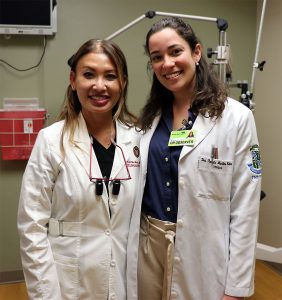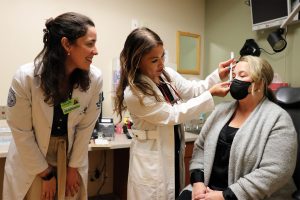Brazil Resident “Finds her Sparkle” at the University of Wisconsin-Madison
When Renata Martins Maia, MD talks about ophthalmology, her eyes sparkle, conveying the passion that drove her to travel more than 5,000 miles for the next phase of her career. Maia left the University of São Paulo, Brazil in September for a five-week residency observership with the University of Wisconsin Department of Ophthalmology and Visual Sciences (DOVS).
The department’s Global Ophthalmology Initiatives (GOI) Research and Clinical Observership program started in 2017, thanks to a sponsorship with the non-profit Combat Blindness International (CBI) and the University of São Paulo. It provides a global ophthalmology resident the opportunity to spend five weeks with DOVS faculty, observing in clinic and the operating room, participating in educational opportunities, and conducting research under the guidance of a faculty mentor.
Maia credits her parents – her mother a cardiologist and father an ophthalmologist – for inspiring her love of medicine and her interest in plastic surgery. “At first I wanted to do plastic surgery,” she said. “But eventually I realized that was not what I was looking for. Then I started in ophthalmology, and I loved it. You have so many choices within the specialty, including oculoplastics. It was a perfect fit.”
Because of her interests, Maia partnered for the five weeks with Cat Burkat, MD, FACS who specializes in oculoplastic, reconstructive, and orbital surgery. “Dr. Burkat is artistic and thinks ahead,” Maia said. “She’s always four steps ahead, which is great because you often have to be creative and think about other ways besides the traditional to help a patient.”
In addition to contributing to two research studies under Burkat, observations in clinical and surgical services including oculoplastics and neuro ophthalmology, Maia attended the American Society of Ophthalmic Plastic and Reconstructive Surgery annual fall symposium and the national American Academy of Ophthalmology conference in Chicago. She also participated in the department’s annual Right to Sight Eye Clinic, another partnership with CBI.
Maia’s primary research was a Botox study to determine whether there is a correlation between forehead injections and diminished hand sensitivity. “We think of Botox as a cosmetic treatment,” Maia said, “without really understanding the potential long term medical implications.”
The second research study investigated Parry-Romberg Syndrome, a rare disorder that causes deterioration of the skin and soft tissues on half of the face. The project reviews past medical records to assess whether current treatments are effective. “This is not a common disease in Brazil,” Maia said. “But now, I’ll be able to recognize it when I see it and know how to treat it.”
Maia noted some significant differences between patient care in the United States and Brazil, particularly in terms of patient privacy. In Brazil, exam rooms are large, open areas, with multiple patients sharing the same space. “Private information is given in a very public space,” Maia said. “We need to change that.”
Further, Brazilian doctors see as many patients per day as physicians trained in the United States, Maia noted, but with far less support. “In Brazil doctors complete all aspects of a patient’s appointment, from start to finish, including paperwork and transport to other departments,” she said. As a result, Brazilian doctors are less effective.
Perhaps most importantly, Maia learned skills and techniques that will help her communicate more effectively with her patients in Brazil. “You have handouts and other informational materials to assist in informing patients of their disease and the options for treatment. You use colored pencils and draw for them,” she said. “I’m going to try to do that as well back home.”
Maia’s experience in Madison wasn’t all work, as she took time to explore the community as well. She went to the capitol, the farmer’s market, the zoo, and a dog park. She traveled to Devils Lake and spent a day in Milwaukee. She even experienced a Badger football game. “I learned to jump around,” she said with a laugh. And, of course, she sampled Wisconsin food, naming cheese curds and apple pie as her favorites.
Maia credits DOVS faculty and education team with making her feel welcomed and supported. “They did their best to integrate me fully into the department,” Maia said. “Even though they were busy, they did not forget I was there. I’m grateful for that.” She specifically noted Senior Graduate Medical Education Program Manager, Hannah Baker, in her reflection. “Hannah is the most amazing person in the world. She was so happy and friendly. I can’t be more thankful for her than I am.”
The five weeks went quickly, but it was time well spent. Maia said it has motivated her to research international fellowship programs in oculoplastics in the United States. As she returns to her family and her residency at home, she brings with her new information, a greater experience, and something intangible. “I found my sparkle,” Maia said.

